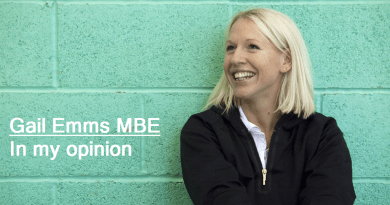“Business pays maternity leave, why should sport be different?”
Reshmin Chowdhury makes the case for maternity rights to be extended to sportswomen who take time out to start a family. Who knows, she says, the positive message it would send out might even be good for the governing bodies and sponsors
We are without a doubt witnessing the meteoric rise of the ‘sporting supermum’. Jessica Ennis-Hill ‘s recent World Championship gold will probably go down as the most impressive professional performance of her illustrious career. The heptathlete not only built on her victory at London 2012, but she did it just 13 months after the birth of her first child, Reggie.
She follows the likes of golfer Catriona Matthews, Lioness Katie Chapman, Olympic rowing champion Anna Watkins – who is gunning for Rio 2016 with two children under two – and the woman who arguably began the ‘revolution’ in 2014, mum-of-two Jo Pavey. Incredibly, she became European 10,000 metres champion ten months after the birth of her second child.
This band of women have shown that if you are an elite athlete, motherhood need not be an obstacle to reaching to the top of your profession.

KATIE CHAPMAN
The 33-year-old England and Chelsea footballer, FA Cup winner, member of the fêted Lionesses squad who won bronze at the Women’s World Cup this summer, is mum to Harvey (12), Riley (6) and Zachary (2). She temporarily lost her England central contract due to family commitments under former manager, Hope Powell.
“Yes, sports should pay maternity leave to female athletes. I think it’s important that people see that women can manage to have a family and a career. Business pays maternity leave, why should sport be different?
“I’m really glad I’ve had children. I’m glad that they can see me play and watch my career. I don’t want to be telling my kids about me playing football and showing them pictures when it’s over. I like it that they’re actually seeing some of my career. I’m so thankful for that. All three boys come to every single game with my husband. I love that. They’re fans. To let them experience that is great.
“In the case of football, it’s only recently that maternity leave has been covered in contracts. That’s a shame. We are female. We play football. Pregnancies are part of life. But maternity leave and pay has only been introduced into our FA central contracts in the last three or four years. Before that there was nothing.
“It’s been tough for women. Really hard. Without maternity leave you have to get yourself fit and back to work to start earning your money again. You feel you’re punished for having children. But times are changing. Women are becoming stronger. Standing on their own two feet. Running businesses, having sports careers. I think it’s time we changed.”
There are a growing number of powerful women enjoying high-profile careers in business and other industries while maintaining a family life. So is it time for sport to recognise this new trend and introduce maternity pay?
The issue of maternity rights was first conceived in 1911 when the National Insurance Act included a universal maternal health benefit. Even as recently as the 1980s, the issue of maternity leave was still a grey area and at the mercy of individual companies. That meant a generation of women may have put off their careers until after having families, or they were forced to make a choice. It was not until almost the turn of the 21st century that women were entitled to paid leave. In 2011, the European Parliament decreed that all companies should grant maternity leave at full pay for 20 weeks, followed by a statutory rate of £125 for the remaining 46. Paternity rights have also evolved since 2003.
However, professional sportswomen, for the most part, do not enjoy these benefits, despite the fact that sport is their job. It is no wonder that when the idea of truly competitive sport was set up during the 19th century – by men, for men – maternity leave was not at the forefront of their minds. But the fact that there is no protection for pregnant athletes in 2015 is, in my opinion, not acceptable. Typically, an expectant mum in sport will be considered to be in the ‘not competing’ category, and would have her funding removed, much as if she was injured. Putting it crudely, it is as if female athletes are at worst punished, and at best ignored, for being biologically programmed to bear children.
Conversely, large sections of the business world have woken up to the fact that mothers are extremely valuable assets. Statute dictates that they will enjoy maternity benefits because they are expected to go back to work. This is by no means a perfect model and many women have experienced the rough end of the system on their return. However, the model exists and that is a huge plus.
JO PAVEY
The four-time Olympian, having represented Great Britain in every Olympic Games from 2000 to 2012, she is a European 10,000 metres champion and two-time 5000 metres medallist at the Commonwealth Games. Domestically she is mum to Jacob (born 2009) and Emily (2013). Husband Gavin is her coach.
“It would be great if sportswomen could be supported during maternity leave, as happens in other professions. Female athletes who are mums can be such great role models. We want to avoid sportswomen feeling that if they have a child that’s absolutely the end of their career. Look at positive role models like Jess Ennis-Hill and Anna Watkins. We need their example to encourage women that they can be like that. They can be mums while still competing.
“I believe that having my two children definitely made a difference to my career. I’m sure it relaxed me and, in a way, made me a better athlete. Maybe it wasn’t a coincidence that I won my European 10,000 metres title – as everyone said ‘the oldest female European champion in history at the age of nearly 41’ – once Jacob and Emily had been born.
“I’ve been able to show the children it’s nice to be active and work towards goals. They see the hard work I put in and all the positive attributes that sport can bring. But it’s also a massive psychological boost being a mum. You could see how happy Jess was at the World Championships recently when she won the title. Obviously, there’s all the juggling to contend with – the physical challenges of getting fitness back and finding time to do everything – but overall it’s such a positive message.
Unsurprisingly, a number of leading mothers across sport are calling for change. England and Chelsea Ladies defender Katie Chapman, who cited childcare issues as one of the reasons for her international retirement until this summer’s Fifa World Cup in Canada, is unequivocal in her support. “We are female. We play football. Pregnancies are part of life … it’s been tough for women. Without maternity leave you have to get yourself fit and back to work to start earning your money again. You feel punished for having children. But times are changing.”
Chapman competes in a sport where the seeds of change are already being sown. The FA, as a direct result of Chapman’s situation, introduced a maternity policy into their central contracts in 2012. This move offers genuine hope that their professional status is considered as worthy as their basic right to motherhood.
But while it is a welcome and ground-breaking initiative, there is some concern that maternity pay alone will not cover the cost of returning to work, and all associated childcare costs – which may not be covered by basic funding. Olympic rower Anna Watkins admits that she has had to consider supplementing her income through sponsorship and has called for other organisations to come on board.
“I think you need the wider world, such as governing bodies and sponsors to be supportive. It’s a complete no-brainer for business to support sporting mothers because it sends out a positive message,” she said.
CATRIONA MATTHEW
The Scottish pro golfer on the US LPGA Tour, represented Europe in the Solheim Cup seven times. She is currently vying for place on women’s golf team to Rio in 2016. She is mum to Katie (born 2007) and Sophie (2009). Husband Graeme is her caddy.
“Obviously, being a golfer, you’re self-employed, so if you’re not working, you’re not working. But to be fair, the Tour has a maternity policy that allows you to keep your ‘status’ [the tournaments you can get in] if you take a year off.
“We’ve juggled a lot. The children travelled with us until they started school, both of them for two years. We look back now and wonder how we did it. It was tough when you’re in a hotel room with two small children. My husband and I used to sit in the bathroom while they were dropping off to sleep. But the Tour had day care which was very good and there would be up between 15 and 20 children in there at one time.
“I suppose for team sports maternity leave could work. I don’t see how it could work for individual sports like mine. But I certainly don’t think women should be discouraged from having children while still competing. Although I think the pressure of two children probably trumps golf somehow. You never know what’s coming next.”
Getting to the gym post-birth is an achievement in itself amid the sleepless nights, nap-juggling and the endless mountains of nappies. But to compete at the highest level – and win, like Ennis-Hill did in Beijing – is simply awe-inspiring. It’s proof that everything is possible. But it has also shed light on the unknown – postpartum elite sports. The heptathlete admits that she and her coach, Toni Minichiello, were stepping into a brave new world when she decided to return to the track, with neither having experience of what top-level training entailed for a new mum.
Yet while there has been no specific scientific study into how pregnancy and childbirth impact athletes competing at the top level, there is plenty of evidence to suggest that motherhood can have a positive psychological impact. Jo Pavey said she felt more content and less pressured once she had her family and could focus on her sport. Ennis-Hill has explained how she battled with the guilt of wanting to relax with her son, but has struck a balance with the desire for success.
I am blessed with two amazing children, aged four and two, born twenty months apart. For me, motherhood has been the most extraordinary gift. It’s also the toughest job I’ve ever had. That proverbial juggling act of being a working mum – and one who travels for work – genuinely leaves me breathless at times and I can testify that no day-job can ever prepare you for it.

ANNA WATKINS
The Olympic gold medal winner in the double sculls at London 2012 with partner Katherine Grainger, she is also a two-time World Champion. She is mum to William (born 2013) and Richard (2015). She is currently attempting to make a comeback in time to row in Rio.
“For me, having decided to go back to rowing, I need to be able to cover my training costs but also the cost of childcare. Even if there was paid maternity leave for sportswomen, unless you were able to earn more than what the UK Sport grant could give you, then it would be difficult to return and you may end up living in a shared room.
“Requirements have increased, so I’m trying to dip my toes into professional income by seeking sponsorship and building partnerships with businesses.
“I think you also need the wider world, such as governing bodies and sponsors, to be supportive. It’s a complete no-brainer for business to support professional sporting mothers because it sends out a positive message for them as employers in their own industry.
“Look at Jess Ennis-Hill. I’m impressed, delighted and inspired in equal measure. It’s a great thing to know for all women who have had a baby, if you have faith and confidence in your body, it will work again and can return to the way it was before.
“In that situation, you just think, ‘It’s over, I’ve ruined it, I’m going to be a wreck for the rest of my life’, so it’s great to think that in the future, things will come good again. For me, I’ve got less than a year, and maybe it isn’t long enough, but why shouldn’t it be enough, why set limits on what I can achieve? Jess’s situation is quite different from mine and, of course, she has just the one baby, so I don’t know if what applies to her will apply to me. But that is what I’m going to find out.”
What I have learnt, however, is that I have acquired time management skills I could once only have dreamt of. I have a level of stamina I never knew I had. I am more motivated than ever because time is precious and for someone who was only ever interested in watching sport, I now make time to train, which makes me feel great, both inside and out. For me, motherhood has made it easier to balance my life, with clearer priorities. It’s also given me the confidence to realise that like my own mother, I’m now a pretty good juggler, albeit a very tired one!
As a freelance journalist and broadcaster, I too had similar anxieties as I slumped into the maternity abyss, wondering how I would ever get my career back on track, with two small children in tow and my job at the BBC now based in Salford. I was very fortunate to have a wonderful manager who was – and still is – incredibly accommodating and made it as easy as possible for me to return to work between and after both pregnancies.
Financially, however, I took a real hit for the three years I was effectively on the sidelines. While I was mostly covered by my contract at the BBC after the birth of my daughter in 2011, I had no entitlement following the birth of my son in 2013. I apparently hadn’t registered as ‘self-employed’ and therefore didn’t qualify. Being in the throes of life with two under two, I didn’t even have the energy to contest it.
Like the sportswomen above, I have an incredible support network at home, based around my husband, both sets of grandparents and a part-time nanny who all cover the fact that my hours are unpredictable and I may be away for a few days at a time. The advent of paternity leave has helped, but the changing notion that both parents should share childcare duties has been a welcome and crucial part of this evolution.
There is so much evidence to show that working mothers are incredibly efficient and highly motivated employees. With the right infrastructure, sport could really begin to embrace this change – and reap the benefits. Of course, there is a huge financial implication which would take the co-operation of a number of bodies and organisations. But I really believe it’s worth at least exploring this investment. After all, even supermums need love and support!
ABOUT THE AUTHOR
 Reshmin Chowdhury is a presenter and reporter at BBC Sports News and BT Sport. She will be reporting on the UEFA Champions League for BT this season and the Rio Paralympics in 2016 for BBC 5Live Sport, alongside her regular duties. She lives in London with her husband and two children and was recently named an ambassador for HRH Prince of Wales’s charity, the British Asian Trust.
Reshmin Chowdhury is a presenter and reporter at BBC Sports News and BT Sport. She will be reporting on the UEFA Champions League for BT this season and the Rio Paralympics in 2016 for BBC 5Live Sport, alongside her regular duties. She lives in London with her husband and two children and was recently named an ambassador for HRH Prince of Wales’s charity, the British Asian Trust.
——–
If you enjoyed this article, subscribe to the mixed zone and get free updates by email.
Please feel free to republish this article with credit to www.themixedzone.co.uk by Women’s Sport Trust. Images on our site may have licensing restrictions.



Hello admin, i must say you have high quality content here.
Your website can go viral. You need initial traffic boost only.
How to get it? Search for; Mertiso’s tips
go viral